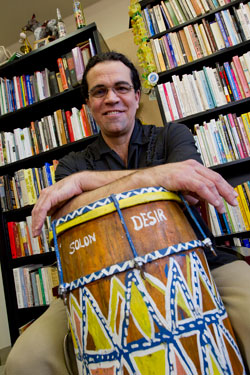Religion professor finds connections through time
Terry Rey, associate professor and chair of the Department of Religion, believes that the world is a smaller place than many people think, and he has worked to pass that understanding on to his students.
“The historical story is something that is shared throughout the Americas. I wanted to find a way to have a course that could, in 15 weeks, help students to grasp that historical interconnectedness of the Atlantic world,” he said.
With this goal in mind, Rey was the primary designer of the General Education course “Race and Poverty in the Americas,” for which he has earned the Provost’s Award for Innovative Teaching in General Education.
The class focuses on three locations — Brazil, Haiti and Philadelphia — examining their historical entanglement through poverty and race relations, and how such factors shaped modern understanding of these concepts.
“The course was spawned in part out of my own life experience in Africa and in Haiti,” said Rey, who spent several years studying, teaching and volunteering abroad. “It was there that I began to reflect critically upon racial disparities in the United States, and I began to see a historical picture that was common between these distant places.”
Rey has also helped update the curriculum for another course, “Religion in Philadelphia,” which takes an in-depth look at the religious history that has shaped the area’s culture and traditions.
In both courses, Rey uses a mixture of media to show connections between the present and the past. He combines stories from his personal experience with historical artifacts, art, music — Bob Marley is a favorite — poetry and film. Occasional guest speakers and field trips to sacred spaces around the city add local flavor and personal perspectives to the learning experience.
Students’ interest, enthusiasm and feedback for the course has helped it grow since its inception in spring 2008. “They’ll go on their own to find places of interest, and they bring their experiences back to the classroom,” said Rey.
“Dr. Rey made every part of class interesting,” said sophomore sociology major Mariel Celentano. “Every day I could tell he was excited about what he was teaching us … He is one teacher who was truly engaged and devoted to learning.”
“[Terry] is one of those rare scholars whose mentoring follows naturally from his care and concern for his students, his colleagues, his research participants and community,” said Gayle Pagnoni, who is currently teaching a section of “Race and Poverty.”
Rey hopes that his classes will open his students’ eyes to the disparities that exist in the modern world, and inspire them to take action to remedy them. After all, as history shows us, “we are all connected,” he said. “We are all one.”
—Elizabeth DiPardo
